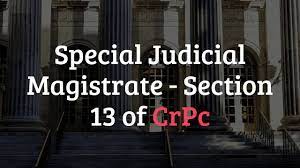Section 13 of CrPC empowers the High Court to confer all or any of the powers of a Judicial Magistrate of the first or second class on any person who holds or has held any post under the government, in respect of particular cases or to particular classes of cases, in any local area, not being a metropolitan area. Such magistrates are called Special Judicial Magistrates.
The purpose of Section 13 of CrPC is to enable the High Court to appoint experienced and qualified persons to handle specific types of cases or classes of cases. For example, the High Court may appoint Special Judicial Magistrates to handle cases related to economic offences, cybercrime, or environmental protection.
Special Judicial Magistrates are appointed for a term of one year at a time. They can be removed from office by the High Court at any time.
Special Judicial Magistrates have the same powers as a Judicial Magistrate of the first or second class under the CrPC. This includes the power to:
- Take cognizance of cognizable offences
- Issue warrants of arrest
- Conduct inquiries and trials
- Authorize the detention of arrested persons
- Pass orders on bail applications
Special Judicial Magistrates also have the power to exercise the powers of a Metropolitan Magistrate in relation to any metropolitan area outside their local jurisdiction.
The appointment of Special Judicial Magistrates is a valuable tool that the High Court can use to ensure that cases are handled by experienced and qualified persons. This can help to improve the quality of justice and reduce the backlog of cases.
Here are some examples of cases where Special Judicial Magistrates are commonly appointed:
- Cases related to economic offences, such as fraud, corruption, and money laundering
- Cases related to cybercrime, such as hacking, data theft, and online fraud
- Cases related to environmental protection, such as pollution and illegal mining
- Cases related to intellectual property rights, such as copyright infringement and trademark counterfeiting
- Cases related to human trafficking and other serious crimes
Special Judicial Magistrates can play an important role in ensuring that these cases are investigated and prosecuted effectively. They can also help to protect the rights of victims and witnesses.
It is important to note that Special Judicial Magistrates are not subordinate to the regular hierarchy of judicial officers. They are appointed by the High Court and can be removed by the High Court at any time. This gives the High Court a degree of flexibility in ensuring that the best possible people are appointed to handle sensitive and complex cases.
Here are some more case laws on the appointment and powers of Special Judicial Magistrates under Section 13 of CrPC:
- State of Haryana v. Chanderbhan (2005) 6 SCC 109: The Supreme Court held that the High Court should not appoint Special Judicial Magistrates to handle cases that are already pending before regular judicial officers. The High Court should only appoint Special Judicial Magistrates to handle fresh cases or cases that are pending for a long time.
- Ajay Kumar Jain v. State of U.P. (2007) 4 SCC 482: The Supreme Court held that Special Judicial Magistrates should be appointed on a regular basis, and not just for a period of one year at a time. This would help to ensure that Special Judicial Magistrates have the necessary experience and expertise to handle the cases assigned to them.
- S.P. Garg v. High Court of Delhi (2018) 15 SCC 632: The Supreme Court held that the High Court has the power to transfer cases from one Special Judicial Magistrate to another. The High Court can exercise this power in the interests of justice, such as if a Special Judicial Magistrate is unable to handle a case due to workload or other reasons.
- State of Rajasthan v. Rajkumar (2021) 19 SCC 152: The Supreme Court held that Special Judicial Magistrates can exercise the powers of a Metropolitan Magistrate in relation to any metropolitan area outside their local jurisdiction, even if the case was originally registered in a metropolitan area. This means that a Special Judicial Magistrate appointed to handle a case in a rural area can still exercise the powers of a Metropolitan Magistrate to try the case, even if the case was originally registered in a metropolitan area.
These cases provide further insights into the powers and functions of Special Judicial Magistrates under Section 13 of CrPC. It is important to note that the High Court has a wide discretion in appointing and empowering Special Judicial Magistrates. The High Court should exercise this discretion in the interests of justice and to ensure that cases are handled by experienced and qualified persons.

